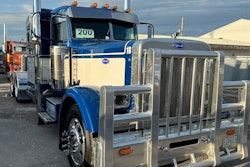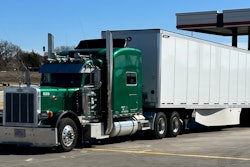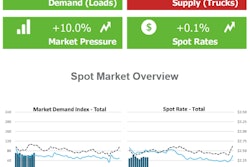Trucking news and briefs for Thursday, March 14, 2024:
Peterbilt intros 72-inch low-roof sleeper option for 589
 The new Peterbilt 589 now has a 72-inch low-roof sleeper option.Peterbilt
The new Peterbilt 589 now has a 72-inch low-roof sleeper option.Peterbilt
Peterbilt's new 72-inch low-roof sleeper is an option for the new Model 589.
The sleeper offers customers a sleek, long and lean styling along with premium amenities for enhanced comfort, efficiency and overall driver appeal, the company said.
“The new Model 589 72-inch low-roof sleeper is the perfect platform for customers that require a low roof configuration for their operations, as well as for drivers who appreciate a stylish truck they can customize with chrome and other accessories,” said Jake Montero, Peterbilt assistant general manager, sales and marketing.
[Related: Two new configurations for Pete car-haulers]
Peterbilt said the new sleeper includes the following storage solutions: full-height wardrobe and passenger side microwave tray, optional right-hand cubby, driver-side workstation and storage cabinet and optional refrigerator and above-the-bunk shelf. It also comes with four standard 12V outlets, factory-installed inverters, aftermarket inverter installation provisions and 22-inch flat-screen TV mounting and electrical provisions.
Customers can order the Model 589 72-inch low roof sleeper through any of Peterbilt’s 425-plus dealer locations across North America.

[Related: Love it or hate it? Peterbilt fanatics respond to the 589 unveiling]
CARB delays ‘smog check’ testing deadline, though early fee deadlines have come and gone
The California Air Resources Board has delayed the effective date for its new periodic “smog check” testing requirements.
The Clean Truck Check program, which required truck owners operating in the state to conduct periodic emissions testing, was set to begin the testing phase on April 1. That date has now been extended to Oct. 1, with a compliance deadline of Jan. 1, 2025. For example, a vehicle with a compliance deadline of Jan. 1, 2025, may submit a passing emissions test as early as Oct. 1, 2024. Truck owners may submit tests no more than 90 days prior to the vehicle’s compliance deadlines.
A portion of the Clean Truck Check program has already been in place, with CARB already collecting registration fees from truck owners operating there. For vehicles operating in California in 2023, the deadline to pay the 2023 annual $30 compliance fee was Jan. 31. If you have not reported your vehicle in CARB’s Clean Truck Check Vehicle Inspection System (CTC-VIS) portal and paid the 2023 fee, your vehicle is out of compliance already, CARB noted.
To avoid a DMV registration block and potential enforcement action, owners are encouraged to complete these actions immediately.
For 2024, the annual compliance fee deadline is due based on the vehicle’s periodic compliance deadline that falls between July 1 and Dec. 31, 2024. Check your CTC-VIS account for your vehicle’s specific deadline, CARB said.
As previously reported, CARB’s Clean Truck Check program replaced the state's Periodic Smoke Inspection Program (PSIP), from which most independent owner-operators were exempt.
[Related: California puts teeth in emission regs with new 'smog check' system]
Transportation spending bill aims to improve under-21 pilot participation, more
A package of spending bills that cleared Congress and was signed by the President last week included Department of Transportation funding and included provisions directly related to trucking.
Most notable: Part of the six-bill “minibus” package were measures related to the Federal Motor Carrier Safety Administration’s “Safe Driver Apprenticeship Program,” which allows individuals aged 18 to 20 explore interstate trucking careers.
The bipartisan infrastructure law enacted in 2021 included a nationwide pilot program to create a pathway for drivers under the age of 21 to operate in interstate commerce, provided the motor carrier met a list of safety standards. When FMCSA launched the pilot program, it required participating fleets to register their apprenticeship programs with the U.S. Department of Labor and equip their trucks with inward-facing cameras, neither of which were included in the bipartisan infrastructure law that established the SDAP.
The new appropriations law bars FMCSA from requiring the use of inward-facing cameras, as well as requiring motor carriers to register an apprenticeship program with DOL in order to participate.
American Trucking Associations President and CEO Chris Spear said those “burdensome and unnecessary requirements imposed by FMCSA sharply limited enrollment" in the SDAP. Currently, only 29 fleets are registered to participate (the Biden administration expected upwards of 1,000). The apprenticeship program was capped at 3,000 participating drivers at any one time but, to date, only three dozen have enrolled, according to ATA.
[Related: Meet Will Dodson, one of just 16 now-unsupervised 'graduates' in the under-21 pilot program]
Another provision in the appropriations package impacts certain truckers in Mississippi. Mississippi Sen. Cindy Hyde-Smith secured a provision to increase the weight limitations for certain agricultural vehicles on the interstate in Mississippi, lifting a prohibition that forced large trucks to operate only on state and county roadways.
Under this provision, vehicles with a Mississippi State Harvest Permit that are transporting agricultural products, such as grain and timber, will be allowed to haul up to the existing state limit of 88,000 pounds on an interstate highway within the state borders.
"Removing these heavy trucks from Mississippi's state and rural roads is a matter of safety, and I think this needed change will improve public safety and commerce in our state," said Sen. Hyde-Smith, whose bill had the backing of the Mississippi Loggers Association, the Mississippi Forestry Association, and the Farm Bureau Federation of Mississippi.
The legislation does not increase the weight of trucks or introduce heavier trucks to the roadways. It only allows trucks currently operating at the state authorized weights to access the safest route and allows them to divert from less direct rural routes that required them to drive through small towns, school zones, pedestrian areas and residential neighborhoods. These trucks and weights have been legally operating on rural and state road systems across the state of Mississippi and other states.
[Related: Are under-21 interstate drivers worth the hassle?]
International trucks recalled for steering gear issue
Navistar is recalling approximately 272 trucks in which the steering gear sector shaft may have been improperly heat treated, which can cause the gear to crack or fracture, according to National Highway Traffic Safety Administration documents. Fractured steering gear teeth can cause a loss of steering control, increasing the risk of a crash.
Affected trucks include model year 2025 HV, HX, LT, and MV models.
Dealers will replace the steering gears, free of charge. Owner notification letters are expected to be mailed April 29. Owners can contact Navistar customer service at 800-448-7825 with recall number 24505. NHTSA’s recall number is 24V-164.
Mack MD trucks recalled over parking brake indicator light
Mack Trucks is recalling approximately 117 model year 2024 Mack MD6 and MD7 trucks in which the parking brake light may indicate the incorrect brake status due to an incorrect parking brake pressure switch.
The recall states that the parking brake light may indicate that the parking brake is applied when it is not, possibly resulting in a vehicle roll away and increasing the risk of a crash.
Dealers will inspect and replace the brake pressure switch as necessary, free of charge. Owner notification letters are expected to be mailed April 26. Owners can contact Mack customer service at 1-800-866-1177 with recall number SC0460. NHTSA’s recall number is 24V-167.










